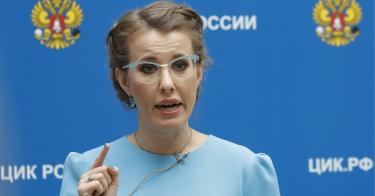Russia’s presidential election will take place on March 18 — but don’t expect any surprises. Despite the presence of eight candidates on the ballot, one clearly stands out: the incumbent Vladimir Putin. After almost two decades of consolidating his power, he is essentially guaranteed to retain the position.
The candidate listed directly below him on the ballot is Ksenia Sobchak, who is notorious in Russia but virtually unknown in the United States (despite a recent visit here). Dubbed “Russia’s Paris Hilton” from her past career as a reality TV show host, she is now running for the Russian presidency as an opposition candidate. But let this be known: America should not be fooled by her.
For approximately the past 10 years, Sobchak has worked in journalism and politics, and in December 2011 began to speak out against the Kremlin. Then this past October, she announced her official run for president.
Sobchak knows for a fact that it is impossible to win against Putin. She is running with an alternate purpose in mind — to promote nonconformist values in Russia (“liberal values,” as she called them in a recent NPR interview). These values, according to her, include freedom of speech and rule of law, which are not customary in Russia as they are in the U.S.
But we shouldn’t let her appeal to basic freedoms blind us to the fact that Sobchak has her own interest in mind more than Russia’s.
Her focus is on the long term: She has admitted that she plans to run in the 2021 Russian Duma election. Why would she proclaim her run for the Duma when that election is three years away, amid her current run for president?
One viable explanation is that she “wants to use the polls as a springboard for her political career,” as Financial Times reporter Kathrin Hille has put it. She may seek to win a spot in the Duma to gain firsthand experience in politics, which would increase her likelihood of winning in the next presidential election.
It is logical to wonder how much of an “opposition” figure she really is. After all, Aleksei Navalny, perhaps the most outspoken critic of Putin, is barred from running in next month’s elections. The fact that Sobchak is allowed to run implies that the Kremlin evidently favors her to some degree.
This is why American policymakers shouldn’t fall for her rhetoric of more freedoms in Russia. It is extremely probable that Sobchak is the voice and embodiment of a full-blown Kremlin ploy to make the election appear democratic and legitimate. She claims to be an “opposition candidate,” but other than her support for freedom of speech and rule of law, many of her ideas are not far off from Putin’s.
A closer look at her positions and background shows she is close to Putin’s way of thinking — and indeed close to Putin himself.
Sobchak’s late father, Anatoly Sobchak, was Putin’s mentor and the one who launched Putin’s political start in St. Petersburg in the 1990s. Due to this close association, many suspect that Sobchak is even Putin’s goddaughter.
During a visit to Washington, D.C., a few weeks ago, she failed to acknowledge that Crimea belongs to Ukraine, and not to Russia, and suggested resolving the dispute by holding a referendum to determine the fate of the peninsula. Since Russia’s illegal takeover of the peninsula in 2014, a crackdown on basic liberties and the expulsion of Ukrainian political leaders mean that such a referendum would not be free nor fair. Her suggestion for Crimea is simply a variant of Putin’s.
In addition, during her visit in Washington, one of her main points was that the U.S. shouldn’t isolate Russia as it has in the past, because destabilizing relations with such a large nuclear power is incredibly risky. This might sound like Kremlin propaganda, because it is; the Kremlin continually strives to shift the blame onto the U.S. rather than on Russia.
Americans love a celebrity, but they shouldn’t trust Sobchak. She may appear harmless and insignificant, especially as one who will lose in the Russian election, but her interests are not as benign as they appear. She has gained much traction and publicity during her campaign and will only continue to do so after the March 18 election.
At the end of the day, she is an advocate of many of Putin’s policies that pertain to geopolitics. Russia has proven itself an untrustworthy foe of the United States, and she is unlikely to change this. America must remain wary of Ksenia Sobchak and her charms.
This piece originally appeared in Washington Examiner



